
It stands to reason that the most singular film experiences come from the efforts of a single individual. This is why I love low-budget film, because the less available funding a filmmaker has, the less crew members they can hire, and the smaller their crew is, the more they rely on their own ingenuity for every single aspect of the process, thereby practically ensuring that the outcome will be an undistilled product of the filmmaker's creativity. Case in point: the very singular Glen Gruner, who wrote, directed, produced, acted in, edited, distributed and most likely even catered what is, in my opinion, one of the most criminally underseen cult films of the early 1990s: The Skid Kid.
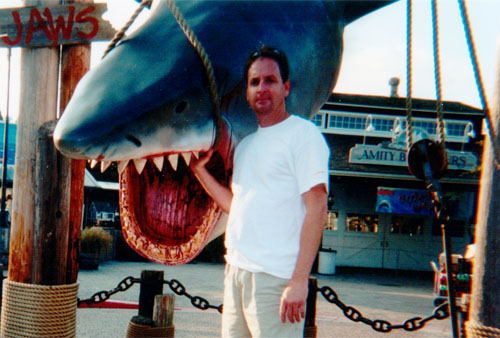 |
Trash Nite: How did you get interested in making films?
Glen Gruner: The thing that kinda got me started -- and I know we're going way back -- was watching Steven Spielberg's Jaws in the theater in 1975. I saw that and couldn't wait to make my own movies. The next day, I reached into my dad's closet and grabbed his camera. I made a lot of home movies and the interest grew from there.
TN: Do you still have any of those?
GG: Oh, yeah.
TN: Were they scripted, plot-based films, or...
GG: Well, I made so many movies all throughout my teens, little three-minute and five-minute things. Skits, things like that. Boy, I gotta go digging through the archives for those! None of those had sound. Later, I bought a Super 8 camera, and that had sound. A whole new dimension! [laughs]
TN: Had you done any professional film work before The Skid Kid?
GG: There was a movie I worked on as a production assistant called A Pleasure Doing Business.
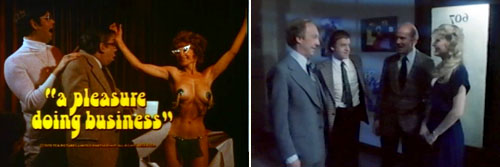 |
TN: With Phyllis Diller and Mr. Drummond from Diff'rent Strokes!
GG: Yeah! I was 19 years old and it was shot here in St. Louis. I think it was 1979 or something. Basically, I was kinda like the gofer, the coffee guy, you know, but I got to see how it all worked. "Hey Glen, gimme some coffee!" You've got to work at that level on at least one movie so you know what it's like.
TN: Did you get to spend any time with the actors?
GG: Absolutely. I picked 'em all up from the airport and I brought 'em all to the set and made sure they got coffee in 'em. That was it! That was my deal. That's how I got started. I always wanted to move out to Los Angeles and go to USC Cinema School but I was never able to pull it off.
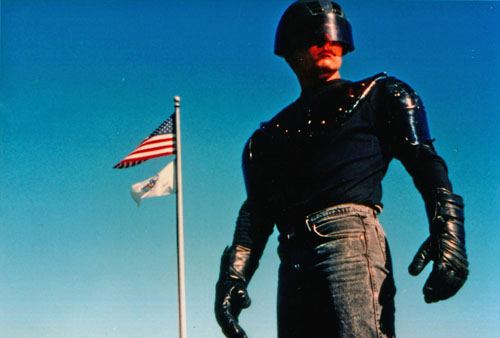 |
TN: So, The Skid Kid. This started out as a college project?
GG: Yes, it was a college film and it was shot on Super 8, with a camera you could buy at Target, you know? We started out doing some single-frame stop-action stuff and shot this 15-minute college project. What happened is, years later, someone said, "Hey Glen, this turned out pretty good, why don't you add another hour to this thing and put it in some video stores?" So we started filming the feature-length version in 1989.
TN: How much of the 15-minute version appears in the feature-length?
GG: Well, the 15-minute college version got all chopped up and put into this thing, so it's pretty much all in there.
TN: Not a wasted frame, no deleted scenes?
GG: None.
TN: Which parts were from the original film?
GG: The state trooper getting shot...pretty much every scene where there's a police officer involved was from the original shoot.
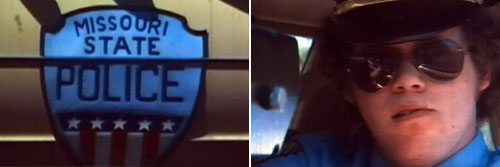 |
TN: How did you end up deciding on a superhero theme for your first film?
GG: Well, horror was out. Horror and splatter movies were a dime a dozen, and I knew I couldn't make a comedy or a drama, because the chance of that making it would be minimal with a bunch of amateur actors. So, I knew I couldn't fool adults. They're gonna go, "Oh, the picture quality's bad, the acting stinks," but 10-year-old kids don't care what film stock you use! All they wanna see is action. I'd shot a bunch of test footage before I set out to make the film and little kids all went crazy watching it. So that's why I made a kids' movie. Plus, in those days, Batman was huge, superheroes were the thing, so that's what video stores were looking for.
TN: How long did shooting last?
GG: We spent two summers making it and it was lot of work. To shoot a scene where The Skid Kid scoots by on the highway, do you know how we had to do that? One frame at a time. I'd say, "Move up six inches!" -- freeze -- I'd shoot one frame. "Move up six inches!" -- freeze -- another frame. Just a shot of him flying by for three to four seconds was a thirty-minute shoot. And we didn't have permission to close the road or anything, so if a car would come by after fifteen minutes, he'd have to get off the highway and it would ruin the shot. The other problem we had was that we couldn't have any leaves or trees in frame, because the movement of the leaves would ruin the shot, too. We ended up going out to Illinois. There aren't any trees along those highways. Even so, half the footage we'd get back wouldn't look right so we'd have to shoot it again.
TN: Pixilation is obviously an extremely time-consuming process. Given your time and budget, why'd you choose to have him "skid?" It definitely adds a unique fingerprint to the movie, but why not pick a superpower that might've been easier to film?
GG: Well, I'd never seen anything like this done before in terms of a superhero film, and when we were doing practice shots, everybody agreed that it looked pretty neat. I mean, with all the special effects people can do on computers now, there's a lot of crazy stuff, but twenty years ago when we made this thing, I had never seen it done before in a feature-length film. And yeah, it was time-consuming. I challenge anybody to try it. I actually went through about ten Skid Kids. What happened was, everyone would be like, "Oh, I'll do it, I'll do it," and then I'd put 'em out on these highways in 100-degree weather with that black outfit on? They'd quit after four hours!
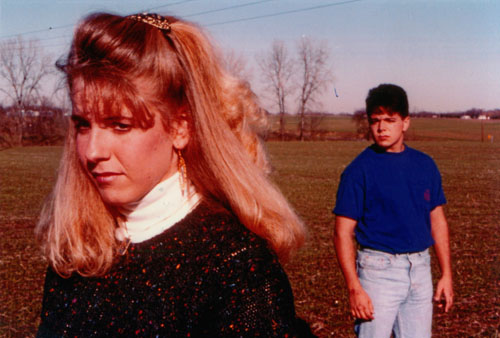 |
TN: And then you hired Gary Wolf.
GG: Yep. I couldn't have been luckier. Gary Wolf, Scott Wolf and Jessica Wolf? They're all naturals. They're all made to be in front of a camera. Without them, this movie wouldn't have gotten made. We'd be shooting over in Illinois and there'd be a crowd watching us, and anybody else would say, "Hey, let's wait until this crowd disperses," but Gary would be standing out there in the crimefighting outfit, saying, "I'm ready! Let's roll!" He just didn't care.
TN: They were easy to work with?
GG: Oh, very easy to work with. The best.
TN: Did you ever see Scott on Party Of Five or on the cover of Tiger Beat after that and think, "Hey, I discovered that kid?"
GG: A couple of years after the movie was out, Scott Wolf came out with a couple of big movies and they were calling him the next Tom Cruise -- I remember that -- and I'm sitting there thinking, "Wow, I wish I would've used him in more scenes!" [laughs]
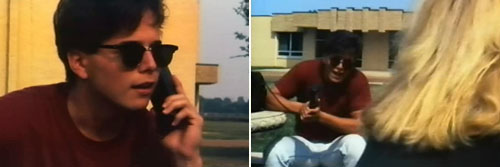 |
TN: Gary told me that he's the one who got him hired.
GG: Yeah, Gary brought him to the set one day, and we shot a couple of scenes. He's a world-class actor too, so how can you just let him sit on the sidelines when he's there?
TN: [laughs] You were actually in the film too, as well as the rest of your family, right?
GG: How'd you know that?
TN: There are about four Gruners listed in the credits!
GG: You read the credits?! [laughs] Yeah, my mom's the newscaster and my dad's the police chief being interviewed by her. And then my brother and I were both FBI agents. Oh man, this movie is so low-budget. This is no lie -- some of those FBI agent scenes, I would put the camera on a tripod, turn it on, say "we're rolling," and I'd go get in the scene. The camera would be running by itself, no cameraman. That's how low-budget this was.
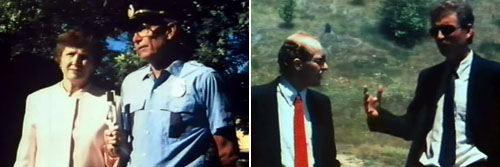 |
TN: I had a sneaking suspicion that the Director Of Photography, who's credited as David Renurg -- which is obviously Gruner spelled backwards -- was probably one of many pseudonyms you used throughout the credits.
GG: You are correct. David's my middle name. You must've watched this movie twenty times! That amazes me. Those names, those five hundred credits you see at the end? Those are all made-up names. [laughs] Because I didn't want to just have five names at the end! Half of them are my friends who really didn't have anything to do with it. I said, "You're gonna be the art director!" and they said, "Oh, okay, fine!"
TN: So did you put together the Skid Kid costume yourself, too?
GG: I went into a bicycle store and asked for the wildest helmet they had. They handed me the one that's in the movie and I said, "Sold!" Now I got the helmet, and I figure he's gotta be all in black. Next thing, boots. I went into a motocross store and asked for the wildest boots they had. They said, "Right here!" I said, "You got any used ones?" [laughs] Black shirt and a black pair of pants and we were in business. I told my buddy, "You're in charge of costumes," and he got screen credit for that. In fact, I got a buddy of mine, to this day, twenty years later, he's telling girls he was the fight choreographer of The Skid Kid! And he was only on the set one time! [laughs] So how 'bout that?
TN: [laughs] Is that working out pretty well for him?
GG: For him, yeah! Doesn't work out too well for me! I tell him, "I thought I choreographed all those scenes!" "Well, read the screen credits, Glen -- it says I did!" So there's a lot of buddies of mine that are still getting play off this thing.
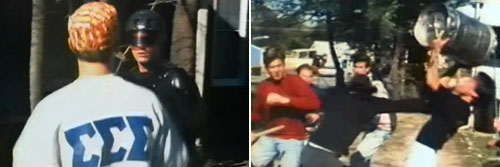 |
TN: While we're talking about credits, some of the nicknames for the thug actors make them sound like legitimate thugs: "King," "Jumbo," "Thirsty." Where'd you find these guys? Were they buddies of yours as well?
GG: Those guys, they were all in a fraternity house that I went up to and said, "Hey, we're making this movie, you wanna be in it?" And they would tell me, "This is the name I want you to put down for my screen credit." And we did the first fight scene you see in the movie with all these guys. We shot it in front of their fraternity house, about twenty guys come running out to fight The Skid Kid.
TN: The fact that they were frat guys helps explain why one of them was using a beer keg as a weapon! [laughs] I was thinking you had found martial arts students or maybe bikers. Speaking of which, what's the story with that kid who rides the never-ending wheelie all through the opening credits? That must be the longest wheelie ever filmed.
GG: I was filming this bicycle motocross race, and I actually asked around, "Is there anybody here who can do a really long wheelie?" [laughs] Because I knew I wanted there to be a kid riding like this in the opening credits. And somebody pointed this kid out, so I asked him if he thought he could do a wheelie for the length of a football field and he said, "Sure I can." And he lived over in Illinois, so I just met him over there one day on this back road that he lived on and he just let it go! He rode and rode and rode. I didn't really know who he was. I just got his name and that was it. Haven't seen him since. I'm sure he's never seen the movie.
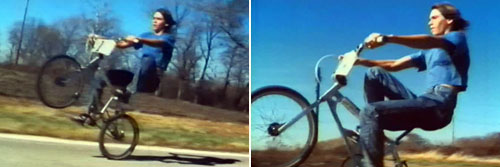 |
TN: He's probably still riding that very same wheelie, twenty years later. [laughs] You got him started and he couldn't stop.
GG: When we were actually shooting that scene, I was sitting on the back of a truck with this black camera in my hand, way out in the middle of this long highway, and somebody called the highway patrol on us! They thought the camera looked like a gun and that I was trying to murder this kid riding his bike.
TN: Was that the only time you ran into trouble during filming?
GG: No, a farmer came out with a shotgun when we were doing the final scene with the black Corvette and the boots in the middle of the road. We had driven that Corvette up and down this patch of highway a few times and he came walking out with a shotgun in his hand and said, "Can I ask you just what the hell you guys are doing?" I said, "We're making a student film." And he said, "Well...okay. That was about the only excuse I was gonna be able to live with." I think he thought he owned the road out by his farm or something.
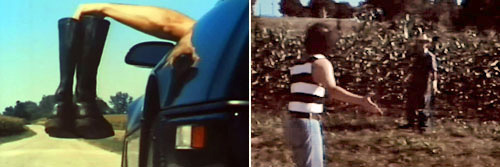 |
TN: There's a grumbling farmer in the film who emerges from a cornfield just to complain for a few seconds. Did this interaction inspire that?
GG: Sort of. Things like that. You know how it is when you're out there in small towns way out in the sticks. It's mostly farmers and they just gotta keep an eye on their property. I mean, you're in Kansas, you know what that's all about!
TN: [laughs] How did you finance the film?
GG: Basically, it was my own money. Nobody would finance this. You tell somebody you're going to shoot a movie on Super 8 film, they're going, "Are you crazy?"
TN: So I take it the RC Cola can wasn't the result of a paid endorsement?
GG: That was not. Though -- funny story -- I had distributors calling me up after we finally got the movie sold, saying, "Hey man, you owe me some money. My kid just emptied a couple of soda cans into a brand-new pair of tennis shoes!" [laughs] Calling me up, holding me responsible for his kid filling up his shoes with Pepsi.
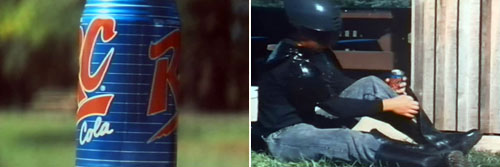 |
TN: If a pair of size-5 Nikes had to be sacrificed for this, so be it. As far as I'm concerned, using cola for magic boot fuel is just one of the many things that help to elevate this from a simple kids' movie to something that's almost surreal. What are some of your personal favorite moments from the film?
GG: My favorite scene now is the one where all the Wolfs are in there, because at the time, I didn't realize what talent I was sitting with, what those guys were capable of doing, you know? I didn't give them a script or anything! I basically just fed them lines and they would do it on the first take. They were just great.
TN: You hadn't written a script before filming?
GG: Well, I had the story, but during filming I was actually writing dialogue, sometimes the day before it was being shot. The way we were working, you kinda had to write the dialogue for however many people you could get together on a Saturday. Sometimes two guys would show up, sometimes three, whoever you could get to drive out to Illinois in a suit and tie to play FBI agents all weekend.
TN: How many of the people in the film were hired actors and how many were friends you recruited?
GG: Pretty much everybody in the whole movie were just locals, working for free. I think I gave Gary Wolf gas money, maybe, that's about it, but there was no money. I used to tell everybody, "If I have to pay you, then we can't buy film!" [laughs]
TN: How involved were the schools and businesses you used as locations during filming?
GG: Not that much. They were really unaware that we were even shooting there. We didn't even bother to get permission, we just went over there on the weekend and shot it.
TN: Was that the reason for the complete lack of interior shots?
GG: Well, I wanted distributors to think I had shot it on 16mm and when you take Super 8 film indoors, the picture quality goes way down. No matter how well you light it, it's just too grainy. Natural sunlight is perfect for Super 8 film. Don't get me wrong, I tried shooting indoors, but it looked so bad. That's why I didn't have any night scenes, either.
 |
TN: Was the black Corvette a rental or was someone lucky enough to drive that around on a regular basis?
GG: My buddy -- actually, my best friend -- he had just bought that Corvette. He had just bought it brand new, so I said, "This is gonna be the car that Gary Wolf takes off in."
TN: It definitely adds production value.
GG: You take it where you can get it! I don't think there could possibly be a lower-budget movie ever made. I look back now and it's actually -- it's a miracle that the thing ever actually got made, to be honest with you. Gary Wolf could've pulled the plug halfway through and it would've been over. The only thing that saved it was that the guy had a costume on to where I could use different people in all these scenes. I could use anybody. There were even some scenes where I was the Skid Kid scooting by but nobody knows it. Hey, what were your favorite parts?
TN: Well, I love the handshake between Scooter and his friend. Like I was saying, it's that sort of detail that makes this movie what it is. A less creative director might've had them just go their seperate ways after the dialogue but you gave them an entire choreographed routine to exit with!
GG: [laughs]
TN: My other favorite -- well, my favorite characters, anyway -- are the two guys talking near a power plant, one has kind of a checkered bike cap on, the other has a stocking over his face and a mustache. He never takes the stocking off. I think he's even smoking a cigarette through it later in the film.
GG: [laughs] I forgot about that!
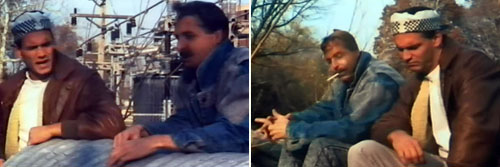 |
TN: Those guys were amazing. Severely underused.
GG: You really mean that? [laughs] Well, the guy with the mustache was actually myself. That particular scene right there, that was one where I had to start the camera, just rolling by itself on a tripod, and just get in the scene. That's me with the mustache and my buddy Dave Barban -- the one who's been telling everybody he was the fight choreographer -- in the hat. No cameraman! Tell me that's not sick, just him and I in the middle of nowhere with a camera eight feet away and a microphone in front of us.
TN: The DIY aspect of the film even carried over to the video release, which you distributed yourself. How did that process come about?
GG: When I finished the movie, I took the package to a video distributor's convention out in Las Vegas and just went from booth to booth with it. I said, "Do you guys have any interest in this crimefighting movie?" They'd say, "Well, we've never seen this one before!" And I said, "Because it's a new release!" So I worked out a deal where they bought a hundred of them and if they sold, I'd send them some more. I went to every booth and a bunch of them told me, "Send me fifty, send me a hundred." So I came home and started shooting boxes of VHS tapes out, hundred at a time, and within a month, they'd call me up and say, "Those hundred are gone -- send me FOUR hundred," and on and on until I'd sold about six thousand copies total, at $19.95 a pop. That's how I did the self-distribution. I actually set up a 1-800 number out of my apartment and I'd answer, "Kingpin Entertainment, how can I help you?" [laughs] Trying to sound like a little movie studio, you know?
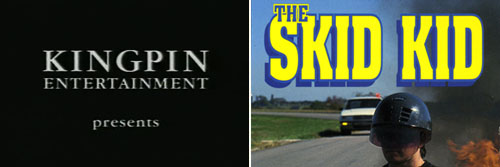 |
TN: How many different distributors were you working with?
GG: Probably about ten. The only ones that were interested in it were the ones who were looking specifically for action-adventure kids' movies. The first thing they'd always say was, "Who's in it?" "Uh, nobody." "Well, thank you anyway, talk to you later!" [laughs] So that killed half of 'em. A lot of distributors didn't care about your film unless it had star quality at the time and this was before anybody knew who Gary or Scott Wolf were. Luckily, though, this was when video stores were looking to fill shelves and I ended up selling all my copies. Some distributors were telling me that video stores had people renting them and not returning them!
TN: Oh, I totally believe that! I'm fairly sure you had just as many college kids as eight-year-olds to thank for that.
GG: [laughs] Yeah, it was great for me! They'd keep it and I'd have to send out more!
TN: So what have you been up to since The Skid Kid?
GG: I've been in the mortgage business. Doing sales jobs and mortgages for fifteen years. But I think about making movies, and it's a lot easier now than it was back in the '80s. You don't have to shoot movies in 35mm anymore, you don't have to pay for film. There are a lot of people making movies in digital HD. You can rent the cameras and shoot a movie a lot cheaper. You know, it's really bizarre, but not a week goes by now, twenty years later, without somebody bringing up The Skid Kid! And I know it's because of the internet, maybe because somebody put the whole movie on YouTube. I don't know who did it but I'm glad they did! To me, it's great, it just makes it that much easier to be seen. See, back when we were shooting this thing, nobody was talking about it. We were out on these lonely, hot back roads for days at a time and nobody thought anything of it. But, in the long run, I think it all paid off. I learned a lot from that first one and I do wanna make another one.
TN: Another one? A sequel?
GG: Well, just keep an eye on 2014! That's all I'm gonna say.
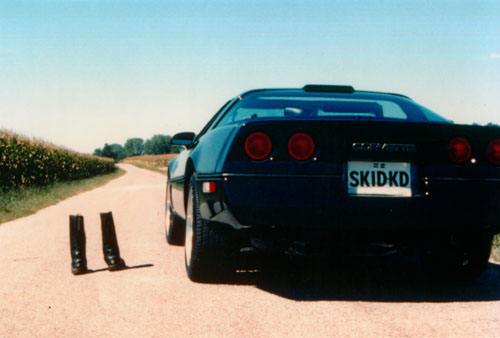 |
Set photos provided by Glen Gruner. Photo of present-day Glen provided by Lauren Lockton.

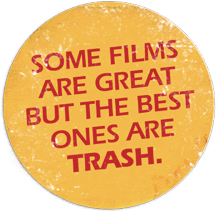

HOW HOW HOW do I purchase a VHS copy of this movieeeee????
ReplyDeleteThis was an excellent interview, thanks! I just found a copy of this in my hometown at the flea market, a great condition ex-rental...it exceeded my expectations!
ReplyDelete